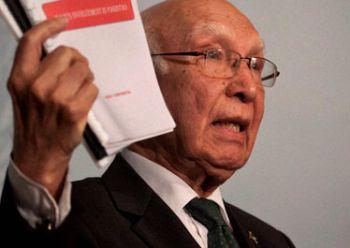 | « Back to article | Print this article |
In India, Sartaj Azizis respected as a man of grace, wit and patience. He is a wizened soldier of many diplomatic battles between the two neighbouring nations
 On Friday, anchors of a television news channel of Pakistan despaired at the prospect that their country’s 86-year-old National Security Advisor Sartaj Aziz, an economist by training, will be faced when meeting India's legendary spymaster 70-year-old Ajit Kumar Doval at the India-Pakistan NSA talks.
On Friday, anchors of a television news channel of Pakistan despaired at the prospect that their country’s 86-year-old National Security Advisor Sartaj Aziz, an economist by training, will be faced when meeting India's legendary spymaster 70-year-old Ajit Kumar Doval at the India-Pakistan NSA talks.
Their concern was that Aziz, a statesmanlike figure, might not be a match for his Indian counterpart who has spent a lifetime checkmating insurgent groups and outmaneuvering the designs of foreign intelligence agencies. The television anchors might have been underestimating Aziz, and only needed to hear the admiration with which India's external affairs minister (Sushma Swaraj) described him as a very "gambhir" or wise man at her press conference on Saturday.
Aziz is a wizened soldier of many diplomatic battles with India and ably steered his country through debilitating economic sanctions in the 1990s. He isn't merely the NSA but the de-facto foreign minister of his country.
In the Indian political circles, Aziz is respected as a man of grace, wit and patience. Aziz, in his youth, was an activist in the Muslim League-led movement for Pakistan in the mid 1940s, but is known to be less than hawkish on India-Pakistan relations, and has in the past cautioned his country's rulers to think of the economic costs of an armed conflict with India.
Born in 1929 in the Kakakhel family of Khyber Pak thtunwa, Aziz studied at Punjab University in Lahore. In 1952, he joined the ministry of finance in the planning commission. Aziz earned a Masters' degree in development economics from Harvard University in 1963. In 1971, Aziz started his international career. He served in the Food and Agriculture Organisation of the United Nations.
Aziz was deputy secretary general of the World Food Conference held in Rome in 1974. According to his profile on Pakistan foreign ministry website, he was "one of the architects of the global food security system which emerged from the conference and of the proposal to establish the international fund for agricultural development."
Aziz returned to join the government of General Zia-ul-Haq as junior minister for food and agriculture from 1984 to 1988. In 1990, the newly-elected Prime Minister Nawaz Sharif appointed him as finance minister of his Pakistan Muslim League-N government. He was again the finance minister from 1997 to 1998.
Aziz was his country's foreign minister during the India-Pakistan Kargil conflict of May to July Kargil war of 1999. He had then termed New Delhi's response an "over-reaction on India's part". In 1998, Aziz reportedly advised his government against testing nuclear weapons in response to India's Pokhran tests, as this would invite economic sanctions, but years later said the tests were needed at the time. Aziz associated himself with educational activities during the Musharraf years.
He returned to politics when Sharif led his party to a victory in the 2013 elections. Aziz has also authored a couple of books, including Rural Development: Learning from China, published in 1978.
As for India-Pakistan relations, Aziz has maintained that the two neighbours need to resolve the Kashmir issue. This is what he said after the Kargil war: "How can two such large countries, both nuclear powers, live in such tension and uncertainty? The relationship has to improve and it cannot improve unless we have negotiations and deal with Kashmir, which is a reality."
Image: Pakistan's NSA Sartaz Aziz shows dossiers of India's involvement in his country during a presser in Islamabad on Saturday. Photograph: PTI